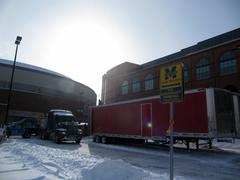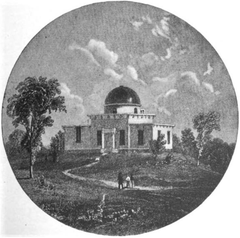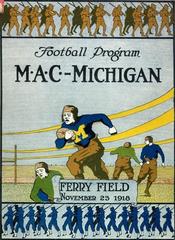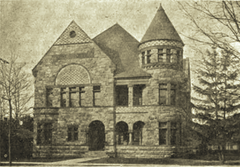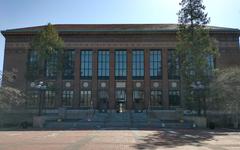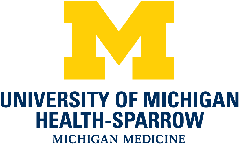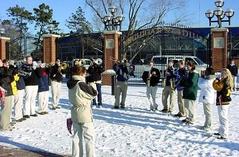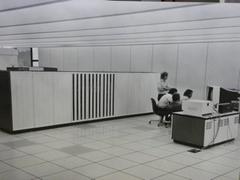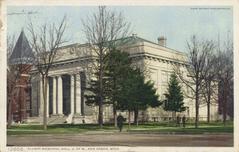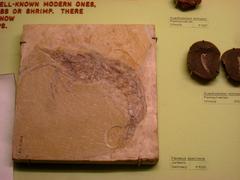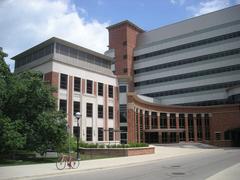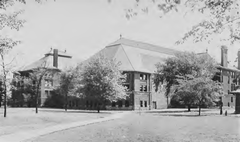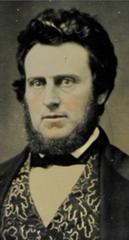Terhune Pioneer Cemetery Visiting Hours, Tickets, and Comprehensive Guide to Ann Arbor’s Historic Site
Date: 14/06/2025
Introduction: History and Significance
Nestled within the historic landscape of Ann Arbor, Michigan, the Terhune Pioneer Cemetery stands as a poignant testament to the city’s earliest settler heritage. Established in 1825, just a year after Ann Arbor’s own founding, it is the city’s first known burial ground. Originally designated by Luke Whitmore to inter his daughter, Emily Whitmore, the cemetery evolved into the final resting place for several prominent pioneer families, including the Whitmores and the Terhunes. Among those interred is John Terhune, a Revolutionary War veteran, whose presence lends the site not only local but also national historical significance.
Today, the cemetery offers a tranquil space for reflection and learning, serving as a rare memorial to early American history in the Midwest. Its preservation—despite periods of neglect and restoration—underscores Ann Arbor’s commitment to honoring its origins and maintaining accessible links to the past. Managed by the City of Ann Arbor and supported by local historical organizations, Terhune Pioneer Cemetery remains open to all, inviting visitors to connect with the pioneering stories that shaped the region.
For updated information, official sources such as the City of Ann Arbor Parks and Recreation Department and the Ann Arbor Historical Foundation provide current details and event announcements.
Table of Contents
- Introduction: History and Significance
- Historical Overview
- Visitor Information
- Enhancing Your Visit
- Frequently Asked Questions (FAQ)
- Preservation and Community Involvement
- References
Historical Overview
Founding and Early Burials
The origins of Terhune Pioneer Cemetery date to 1825, marking it as Ann Arbor’s oldest known burial ground (LocalWiki). Luke Whitmore established the site following the untimely death of his daughter Emily, whose gravestone remains among the oldest in the city. In its early years, the cemetery primarily served as a family plot and, over time, expanded to include other pioneer families who contributed to the region’s development.
The Terhune & Whitmore Families
Notable among those interred is John Terhune, a veteran of the Revolutionary War, whose burial in 1839 elevated the cemetery’s significance and led to its renaming. The site honors the intertwined legacies of the Whitmores, Terhunes, and other early settlers, reflecting both local and national historical threads (Ann Arbor Observer).
Decline and Restoration
By the early 20th century, the cemetery suffered from neglect, with many gravestones lost or damaged, and the land at times repurposed for agriculture. The Daughters of the American Revolution, along with city and community groups, spearheaded restoration efforts in the 1930s, installing commemorative markers and preserving surviving gravestones (City of Ann Arbor). Today, interpretive signage and memorial plaques inform visitors of the site’s origins and ongoing preservation.
Visitor Information
Visiting Hours
- Open: Year-round during daylight hours (sunrise to sunset).
- Note: While Terhune Pioneer Memorial Park is listed as open from 6 a.m. to midnight in some city resources, visitors are encouraged to plan visits during daylight for safety and to respect the cemetery’s atmosphere (City of Ann Arbor).
Admission and Tickets
- Admission: Free; no tickets are required.
- Access: The cemetery is unfenced and maintained as a public historic resource.
Location & Accessibility
- Address: Near the intersection of Pontiac Trail and Dhu Varren Road, adjacent to Leslie Park Golf Course (Google Maps).
- Parking: Limited street parking along Pontiac Trail; no dedicated lot.
- Public Transit: Limited bus service available (TheRide).
- Accessibility: No paved paths or accessible parking; terrain is grassy and uneven, which may challenge those with mobility needs. Wheelchair access is limited, especially in wet weather.
- Pets: Only service animals permitted to maintain the site’s dignity.
Guidelines and Etiquette
To preserve the solemnity and historical value of Terhune Pioneer Cemetery, please:
- Remain on established paths and grassy areas.
- Do not touch or clean gravestones.
- Keep noise to a minimum.
- Carry out any trash; no littering.
- Refrain from recreational activities or picnicking.
- Non-intrusive personal photography is allowed; commercial photography requires city approval (City of Ann Arbor Policies).
Enhancing Your Visit
What to Expect On-Site
- Interpretive Signage: Panels detail the cemetery’s history and the stories of those interred.
- Restored Gravestones: Some original markers have been preserved or replicated.
- Natural Setting: Mature trees, native plantings, and a tranquil ambiance ideal for reflection.
- No Facilities: No restrooms, visitor center, or on-site staff.
Nearby Attractions
- Leslie Park Golf Course: Adjacent, with facilities and refreshments (Leslie Park Golf Course).
- Leslie Science & Nature Center: Nature trails and educational programs (Leslie Science & Nature Center).
- Nichols Arboretum and U-M Campus: For those interested in broader historical and cultural explorations.
- Downtown Ann Arbor: Dining, shopping, and cultural events (AllEvents.in).
Community Events
While regular programming is rare due to the site’s solemn nature, commemorative events and historical tours are occasionally organized by local heritage groups. Announcements can be found through the Ann Arbor Parks & Recreation Department and historical societies.
Travel Tips
- Best Time: Late spring through early fall.
- Duration: 20–40 minutes on average.
- What to Bring: Comfortable shoes, water, and a camera.
- Weather: Check forecasts; the site is outdoors with minimal shelter.
Frequently Asked Questions (FAQ)
Q: Are there visiting hours or admission fees?
A: The cemetery is open during daylight hours (sunrise to sunset); admission is free and no tickets are required.
Q: Is the cemetery wheelchair accessible?
A: Accessibility is limited due to uneven terrain and lack of paved paths.
Q: Are pets allowed?
A: Only service animals are permitted.
Q: Can I take photographs?
A: Personal photography is allowed; commercial use requires permission.
Q: Are guided tours available?
A: Not regularly, but local historical groups occasionally organize tours.
Q: Are there restroom facilities or parking?
A: No restrooms or dedicated parking lots; limited street parking is available nearby.
Preservation and Community Involvement
Preservation of Terhune Pioneer Cemetery is the result of ongoing collaboration between the City of Ann Arbor, local historians, and community volunteers. Projects focus on gravestone restoration, invasive plant management, and interpretive enhancements. Volunteers can participate in clean-up days or support local historical societies (Washtenaw County Historical Society).
Visuals and Further Resources
Entrance to Terhune Pioneer Memorial Park, a serene historical site honoring Ann Arbor’s pioneers. Restored gravestones preserving the names of early settlers. Informational panels provide context about the cemetery’s history.
Summary: Key Points and Final Tips
- Historical Importance: Oldest known settler burial site in Ann Arbor, established in 1825.
- No Admission Fee: Free and open to the public during daylight hours.
- Accessibility: Limited; primarily grassy and uneven terrain.
- Preservation: Safeguarded by city and community efforts, honoring both settler and Indigenous histories.
- Visitor Experience: Modest amenities; tranquil, educational, and reflective.
- Engagement: Support ongoing preservation by volunteering, donating, or joining local events.
By visiting Terhune Pioneer Cemetery, you honor Ann Arbor’s early pioneers and participate in the ongoing story of local heritage preservation. For updates, special events, or further visitor tips, consult the City of Ann Arbor Parks and Recreation Department and the Ann Arbor District Library Local History Collection.
For guided tours, downloadable content, and local event notifications, the Audiala app offers curated resources for a richer visit. Share your experiences on social media using #AnnArborHistory to connect with others and help sustain the city’s pioneer legacy.
References
- LocalWiki: Terhune Pioneer Memorial
- Ann Arbor Observer: Ann Arbor’s Oldest Cemeteries
- City of Ann Arbor: Terhune Pioneer Memorial Park
- Ann Arbor Historical Foundation
- AADL Local History Collection
- Washtenaw County Historical Society
- TheRide
- Leslie Park Golf Course
- AllEvents.in: Ann Arbor Events in June
